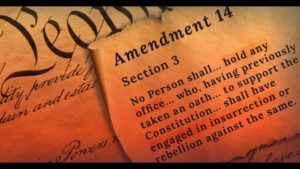 The U.S. Supreme Court (SCOTUS) will hear the case of Trump v Anderson today. The case was appealed from the Colorado Supreme Court which found that Donald Trump had participated in an insurrection on January 6, 2021, and that under the language of section 3 of the 14th Amendment to the Constitution, was disqualified from serving as president in the future. As a result of that decision, the Colorado Supreme Court said that Trump was excluded from being on the state’s presidential ballot.
The U.S. Supreme Court (SCOTUS) will hear the case of Trump v Anderson today. The case was appealed from the Colorado Supreme Court which found that Donald Trump had participated in an insurrection on January 6, 2021, and that under the language of section 3 of the 14th Amendment to the Constitution, was disqualified from serving as president in the future. As a result of that decision, the Colorado Supreme Court said that Trump was excluded from being on the state’s presidential ballot.
This is not necessarily a complicated case. To decide it, the Court will need to determine:
- if Donald Trump participated in an insurrection or gave comfort and aid to those participating in an insurrection,
- if the language of section 3 of the 14th Amendment pertaining to “officers of the United States” includes the presidency, and
- if the oath taken by Trump and every other president requires them to “support” the Constitution of the United States.
First, let’s look at the language of Section 3 of the 14th Amendment:
Section 3 Disqualification from Holding Office
No person shall be a Senator or Representative in Congress, or elector of President and Vice-President, or hold any office, civil or military, under the United States, or under any State, who, having previously taken an oath, as a member of Congress, or as an officer of the United States, or as a member of any State legislature, or as an executive or judicial officer of any State, to support the Constitution of the United States, shall have engaged in insurrection or rebellion against the same, or given aid or comfort to the enemies thereof. But Congress may by a vote of two-thirds of each House, remove such disability.
Next, let’s consider each question SCOTUS will grapple with today:
1)Every court that has considered the question thus far has found that, not only was the breach of the Capitol on January 6, 2021 an insurrection, but that Trump participated in the planning and execution of the insurrection, and gave comfort and aid to the insurrectionists. It’s unlikely that this will be a close call. There’s far too much evidence available for SCOTUS to decided that Trump did not either participate in an insurrection or give aid or comfort to those participating in an insurrection.
2) Trump’s legal team contends that Section 3 of the 14th Amendment does not apply to the presidency. It is true that Section 3 does not mention the presidency by name. Instead, it says, “No person shall be a Senator or Representative in Congress, or elector of President and Vice-President, or hold any office, civil or military, under the United States, or under any State…” Section 3 includes “elector of President or Vice-President” but it doesn’t specifically include the President and Vice-President.
The Colorado District Court found that the language “officer of the United States” includes the President and Vice-President. However, on appeal in the Colorado Court of Appeals, the decision of the District Court was reversed on the basis that the President was NOT an “officer of the United States.” That case was appealed and the Colorado Supreme Court reversed it again, agreeing with the District Court that the President was an “officer of the United States.”
Looked at from a technical basis, the SCOTUS could conceivably find that Section 3 does not specifically the President and they could also find that there is historical evidence to support the proposition that the President is not an “officer of the United States. It’s an iffy proposition, but the Court could use it to reverse the Colorado Supreme Court decision.
However, as a practical matter, it is hard to argue that the framers of the 14th Amendment, who wanted to make certain that members of the Confederacy did not serve in the newly reunified government, would write and pass an Amendment that did not pertain to the two highest offices in the land. There is evidence from the proceedings of the Congress that crafted the 14th Amendment that the framers most certainly intended to include the President and Vice-President in the catch-all phrase “officers of the United States.”
Even so, this SCOTUS has not been great about using actual history as support for their decision. Instead, they have a track record of making a decision that cobbling together historical fact and fiction to justify those decisions. So, it’s anyone’s guess of they will come down on this question.
3) Trump’s legal team also claims that he (Trump) never took an oath to support the Constitution. In fact, the oath that Trump (and all Presidents) took includes the words “to protect and defend the Constitution.” Unlike Congressmen and Senators, the presidential oath does not include the words “support the Constitution.”
This argument involves a difference without a distinction. It’s easy to see that if one protects and defends the Constitution, they are also supporting the Constitution. Section 3 does not require that the oath taken includes the words “support the Constitution. Instead, it requires that the person being considered for disqualification from office must have previously taken an oath to “support the Constitution.” There can be little question that the oath taken by Trump, which required him to “protect and defend the Constitution” required him to “support the Constitution.”
I wouldn’t expect SCOTUS to side with Trump on this question, but you never know. As we’ve seen in the past, SCOTUS is full of surprises.
Is Section 3 of the 14th Amendment Undemocratic?
Although it won’t be part of the SCOTUS proceedings, many commentators–especially those on the right–have contended that, if Section 3 disqualifies Trump, it will take away a voters right to vote for the candidate they support, essentially robbing them of their right to vote. This is a specious argument that sounds good on the surface, but turns out to be exactly backwards when viewed closely.
Rather than Donald Trump, let’s imagine that Barack Obama was running for president. If he were, he would be disqualified from holding the presidency because he has already served two terms and the Constitution sets a two-term term limit on presidents. Applying the Constitutional language, it’s clear that Obama is disqualified.
“But I want to vote for him,” you might say. “You’re preventing me from voting for my preferred candidate. That’s undemocratic.””
While partially true, it’s the Constitution that prevents Obama from running for and holding the presidency. The same reasoning applies to Donald Trump.
The Constitution requires that, to run for and hold the office of the president, a candidate must be 1) at least 35 years of age, 2) a natural born citizen, 3) had not held the office of the president for a total of two terms, and 4) had not participated in a insurrection or gave aid or comfort to those committing an insurrection after taking an oath to support the Constitution of the United States.
These are the four requirement a candidate must meet to serve as President. Although they limit the pool of people any voter can vote for, there is nothing undemocratic about the requirements. In fact, requiring that a candidate must not have participated in an insurrection or gave aid or comfort to insurrectionists, rather than be an undemocratic requirement, is just the opposite. It is designed to support and protect our democracy. Allowing any person that took action to overturn an election or giving aid or comfort to those working to overthrow an election would be damaging, perhaps deadly, to our democracy. The framers who wrote the 14th Amendment understood how dangerous it was to allow such a disloyal, undemocratic person into the leadership of our government. With the 14th Amendment, Section 3, they made certain that such a person would never hold such office.
Trump v. Anderson is arguably the most important Constitutional case SCOTUS has ever heard. It goes directly to who can lead our nation, and it will be interesting to see how the Justices decide this extremely important case.
Post Argument Thoughts
Man, was I wrong. In another post, I predicted that SCOTUS would uphold the decision of the Colorado Supreme Court by a vote of 6-3. I also said there was a chance it could be 7-2. Nope. Not even close.
After watching oral arguments this morning, I can tell you that SCOTUS is not going to uphold the Colorado Supreme Court decision. It was obvious from the the Justices’ questions that a majority of them bought into the idea that the 14th Amendment, Section 3 does not apply to the president or vice-president. Even Justice Katanji Brown Jackson bought this argument hook, line, and sinker.
I found KBJ’s position interesting. Her read of the history was that Congress was concerned about former Confederates gaining (re-gaining) power in southern states, and that the focus of Section 3 was on state and lower federal offices rather than on the presidency.
To be certain, there is some truth to what KBJ said. But her reading of history only reveals part of the picture. Congress was worried about what the impact would be on recently freed slaves in the southern states if former confederates ran things in those states. Congress wanted to avoid that potential as much as possible.
However, that doesn’t mean that the framers of the 14th Amendment weren’t concerned about a former Confederate becoming president or vice-president. They were worried about that, and in their discussions before Section 3 was committed to law, they talked about how their “officers of the United States” language covered the two highest offices in the land. I can’t explain why KJB would choose to ignore that part of the historical record.
There was also a great deal of discussion about the impact a decision in favor of Colorado would have on other states. The Justices seemed concerned that such a decision would make for a lack of uniformity, where some states allowed some candidates on their ballot while other states allowed (or disallowed) those same candidates on their ballot.
That’s not new. It has happened for years and is even happening now. I thought the Solicitor General for Colorado answered this concern well when she said that the discrepancies are a feature, not a bug of federalism. She’s right. The Constitution gives states the power to run federal elections. It does not tell them how to do it and it does not require that each state do it in the exact same way. As a result, we have different states conducting federal elections is different ways. And yet, several Justices were quite concerned about this, as if it was something new and something that should be avoided.
I’ve already proven my lack of predictive skills when it comes to SCOTUS, but I’ll take another shot at it. I predict SCOTUS will overturn the Colorado Supreme Court decision 7-2. And don’t be surprised if the vote is 8-1 or even 9-0. Things were really that lopsided.
